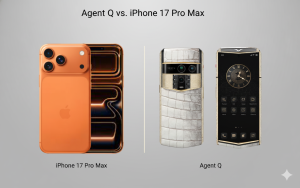In an age where attackers are now prioritizing mobile devices over desktops, enterprise security has never been more critical. Mobile devices have become the primary attack vector for cybercriminals, with over half of organizations reporting smartphones as their most exposed endpoint. For businesses handling sensitive data, intellectual property, and confidential communications, selecting the right secure phone is no longer optional—it's essential.
This comprehensive guide examines the top 10 enterprise security phones for 2025, evaluating their security architectures, enterprise management capabilities, and suitability for different organizational needs.
Why Enterprise Security Phones Matter in 2025
The mobile threat landscape has evolved dramatically. Modern threats include sophisticated phishing attacks, zero-day exploits, ransomware targeting mobile devices, and advanced persistent threats designed specifically for smartphones. People are tricked by social engineering attacks, such as clicking a link or providing information that can lead to exploitation, making device-level security crucial.
Enterprise security phones differ from consumer devices through:
- Hardware-level security components that create isolated environments for sensitive data
- Enterprise mobility management integration for centralized device administration
- Extended security update commitments that protect against evolving threats
- Compliance certifications meeting regulatory requirements across industries
- Zero Trust architecture compatibility for modern security frameworks
- Separation of work and personal data to prevent cross-contamination
Top 10 Enterprise Security Phones for 2025
1. Vertu Agent Q
The Vertu Agent Q represents the pinnacle of enterprise security combined with luxury craftsmanship. Designed for C-suite executives and high-net-worth individuals, this device offers uncompromising protection alongside premium features.
Enterprise Security Features:
- Advanced end-to-end encryption across all communication channels
- Dedicated security processor isolated from main system operations
- Hardware-backed secure storage with tamper-resistant construction
- Integrated private VPN service at the system level
- 24/7 concierge services for executive support and incident response
- Premium materials including sapphire crystal display protection
Business Applications: The Agent Q excels in environments where confidentiality is paramount. Financial executives negotiating mergers, legal professionals handling privileged communications, and entrepreneurs protecting trade secrets benefit from its comprehensive security architecture. The included concierge service provides strategic support beyond technical assistance, handling travel arrangements, security briefings, and urgent communications.
Enterprise Management: While positioned as a luxury device, the Agent Q integrates with enterprise security frameworks through encrypted communication protocols and secure container technologies. Organizations can deploy these devices to key decision-makers while maintaining centralized security policies.
Ideal For: C-suite executives, board members, private equity principals, and high-profile entrepreneurs requiring maximum security with prestigious branding.
2. Samsung Galaxy S25 Ultra with Knox
The Samsung Galaxy S25 Ultra leverages Knox security solution embedded into Samsung phones and tablets, with features active from the moment you turn it on. This flagship offers enterprise-grade protection with mainstream compatibility.
Enterprise Security Features:
- Knox Vault with isolated security processor for sensitive data
- Real-time Kernel Protection working to constantly inspect the core software of the OS
- Secure boot backed by hardware root of trust
- Knox Platform for Enterprise with comprehensive MDM support
- Knox Asset Intelligence sending almost-real-time device telemetry into security information and event management tools
- Five years of security updates with four OS upgrades
Business Applications: The S25 Ultra excels in large-scale deployments. Knox Suite amplifies the EMM tools you already use, further strengthening your enterprise mobility management. Organizations can leverage Samsung DeX for desktop productivity, the integrated S Pen for document signing and annotation, and extensive accessory ecosystems.
Enterprise Management: Knox Mobile Enrollment allows you to securely lock devices to your organization—even after a factory reset—until released by an admin. The platform integrates with major EMM providers including Microsoft Intune, VMware Workspace ONE, and MobileIron.
Ideal For: Enterprises requiring scalable security solutions, organizations with hybrid work models, and businesses needing Android Enterprise capabilities with robust security.
3. Apple iPhone 16 Pro Max
The iPhone 16 Pro Max continues Apple's reputation for security through its tightly integrated hardware and software ecosystem. The iPhone 17 Pro Max uses the Secure Enclave chip to keep your data safe with similar architecture carried forward to the 16 Pro Max.
Enterprise Security Features:
- Secure Enclave coprocessor for biometric data and encryption keys
- Face ID and advanced biometric authentication
- End-to-end encryption for iMessage and FaceTime communications
- iOS updates get scheduled frequently, meaning Apple looks for and patches security issues routinely
- Four to five years of security update support
- Private Cloud Compute architecture for enhanced privacy
Business Applications: The iPhone's strength lies in its simplicity and consistency. Apple typically rolls out iOS updates to all supported devices at the same time, ensuring that the latest security patches, bug fixes and new features are available to users. This uniform experience simplifies IT management and reduces training requirements.
Enterprise Management: Apple Business Manager provides zero-touch deployment, and the platform integrates seamlessly with major MDM solutions. iOS's supervised mode enables granular control over device features and security policies.
Ideal For: Organizations prioritizing user experience alongside security, businesses with existing Apple infrastructure, and companies requiring BYOD-friendly solutions with strong privacy protections.
4. Google Pixel 9 Pro
The Google Pixel 9 Pro delivers enterprise security through its pure Android experience and advanced AI-powered protection. The Titan M2 security chip safeguards sensitive data and strengthens system security.
Enterprise Security Features:
- Titan M2 dedicated hardware security module
- 5 to 7 years of Android security updates, ensuring continuous protection against evolving threats
- Theft Detection Lock and Offline Device Lock protecting data by automatically detecting suspicious motions
- Android Enterprise Recommended certification
- Work profile separation creating secure separation between personal and corporate data
- Advanced baseband security improvements
Business Applications: The integration of Gemini AI brings a new level of security and productivity to enterprise users. The device offers seamless Google Workspace integration, making it ideal for organizations using Google's productivity suite.
Enterprise Management: Google's enterprise management through Android Enterprise provides comprehensive control. The Google Pixel Manage Program provides advanced tools and capabilities for managing large-scale enterprise deployments.
Ideal For: Google Workspace-centric organizations, businesses requiring timely security updates, and enterprises wanting AI-powered security features with strong hardware protection.
5. Samsung Galaxy XCover6 Pro
The Samsung Galaxy XCover6 Pro combines Knox security with rugged durability for field operations. This device targets industries where physical security matches digital protection needs.
Enterprise Security Features:
- Full Samsung Knox security platform integration
- MIL-STD-810H certification for environmental resistance
- IP68 water and dust resistance
- Removable battery for extended operations
- Knox Platform for Enterprise with five years of security updates
- Programmable physical buttons for emergency protocols
Business Applications: Priced around €600, the Galaxy XCover6 Pro has an excellent price-to-quality ratio for organizations needing a durable, secure, and manageable device for their workforce in harsh conditions. Construction, logistics, manufacturing, and field service organizations benefit from its rugged construction combined with enterprise security.
Enterprise Management: The device supports all Knox management features, including Samsung DeX for mobile workstation capabilities. The replaceable battery design ensures operational continuity without device replacement.
Ideal For: Field service operations, construction companies, logistics providers, manufacturing facilities, and any organization requiring durable devices with enterprise security.
6. Silent Circle Blackphone PRIVY 2.0
The Silent Circle Blackphone PRIVY 2.0 focuses exclusively on privacy and secure communications. Running Silent OS, a hardened Android variant, this device minimizes attack surfaces through aggressive security hardening.
Enterprise Security Features:
- Silent OS with minimal attack surface and removed unnecessary services
- Native end-to-end encrypted voice, video, and messaging
- Enterprise VPN built into operating system
- Security Center for real-time threat detection
- Silent Text with burn-on-read messaging features
- Spaces feature for creating isolated work environments
Business Applications: Organizations in regulated industries particularly benefit from this device. Healthcare providers meeting HIPAA requirements, legal firms handling attorney-client privileged communications, and government contractors appreciate the de-Googled environment and comprehensive encryption.
Enterprise Management: The platform integrates with enterprise mobility management solutions and provides compliance reporting features. Organizations typically deploy these devices organization-wide to maximize secure communication capabilities.
Ideal For: Healthcare organizations, legal practices, government contractors, financial institutions, and businesses in heavily regulated industries requiring documented compliance.
7. Bittium Tough Mobile 2C
The Bittium Tough Mobile 2C represents purpose-built security for government and defense contractors. This Finnish-manufactured device meets stringent security certifications for classified communications.
Enterprise Security Features:
- Hardware-backed encryption for all communications
- Dual operating systems with complete isolation
- Hardened Android with extensive security modifications
- Government-grade certifications for classified information handling
- Tamper detection with device self-destruct capabilities
- Ruggedized construction for field deployment
Business Applications: Government agencies, defense contractors, critical infrastructure operators, and organizations handling classified information rely on the Tough Mobile 2C. Its dual-OS architecture separates classified and unclassified communications while maintaining usability.
Enterprise Management: The device supports government-specific MDM solutions and meets requirements for classified network integration. Organizations can deploy separate security policies for each operating system instance.
Ideal For: Government agencies, defense contractors, critical infrastructure providers, intelligence operations, and organizations requiring certified security for classified information.
8. Sirin Labs Finney U1
The Sirin Labs Finney U1 specializes in cryptocurrency and blockchain security. This device integrates cold storage wallet functionality with secure communications for the digital asset economy.
Enterprise Security Features:
- Cold storage cryptocurrency wallet with physical security switch
- Shield OS for comprehensive threat protection
- Three-factor authentication combining biometric, pattern, and physical controls
- Blockchain-verified secure communications
- Behavioral intrusion prevention system
- Tamper-proof sealed firmware
Business Applications: Cryptocurrency exchanges, blockchain development companies, fintech organizations, and digital asset management firms benefit from dedicated hardware wallet integration. The physical security switch isolates the wallet from network connections, preventing remote exploitation.
Enterprise Management: While more specialized than general enterprise devices, the Finney U1 integrates with MDM solutions for basic management. Organizations deploying these devices typically implement specialized cryptocurrency security policies.
Ideal For: Cryptocurrency businesses, blockchain companies, fintech startups, digital asset management firms, and organizations conducting frequent cryptocurrency transactions.
9. Purism Librem 5
The Purism Librem 5 takes a fundamentally different approach to security through open-source software and physical hardware kill switches. Running PureOS based on GNU/Linux, this device appeals to privacy purists.
Enterprise Security Features:
- Physical kill switches for cellular, WiFi/Bluetooth, microphone, and cameras
- PureOS open-source operating system with no proprietary code
- Convergence capability for desktop computing
- No tracking or telemetry from device manufacturer
- Community-auditable security architecture
- Hardware designed for long-term support and repair
Business Applications: Organizations requiring verifiable privacy appreciate the Librem 5's transparent architecture. Investigative journalists, human rights organizations, privacy-focused legal practices, and companies in jurisdictions with strict data sovereignty laws benefit from its design philosophy.
Enterprise Management: The device's Linux foundation requires different management approaches than traditional MDM. Organizations typically implement custom management scripts and leverage standard Linux administration tools.
Ideal For: Privacy-focused organizations, investigative journalism operations, human rights groups, companies in strict data sovereignty jurisdictions, and enterprises requiring fully auditable device security.
10. Google Pixel 9a
The Google Pixel 9a delivers enterprise security at a mid-range price point. This device brings flagship security features to budget-conscious deployments without compromising on protection.
Enterprise Security Features:
- Titan M2 security chip matching flagship models
- Seven years of security updates from device launch
- Android Enterprise Recommended certification
- Theft Detection Lock and Offline Device Lock
- Work profile separation for personal and business data
- Google Play Protect for continuous malware scanning
Business Applications: The Google Pixel 9a is an attractive mid-range smartphone, offering core Pixel strengths like an excellent camera, clean Android experience, and strong AI features at a more accessible price. Organizations can deploy these devices to frontline workers, contractors, or temporary staff without sacrificing security.
Enterprise Management: The Pixel 9a supports all Android Enterprise management features available on more expensive models. Organizations benefit from identical management interfaces across their entire Google Pixel fleet regardless of device tier.
Ideal For: Cost-conscious enterprises, frontline worker deployments, BYOD reimbursement programs, temporary employee provisioning, and organizations requiring security without premium pricing.
Feature Comparison Matrix
| Device | Hardware Security | Update Commitment | Price Range | Best For |
|---|---|---|---|---|
| Vertu Agent Q | Dedicated processor, tamper-resistant | Long-term support | Premium | C-suite, luxury |
| Samsung S25 Ultra | Knox Vault, isolated processor | 5 years security, 4 OS | High | Large enterprises |
| iPhone 16 Pro Max | Secure Enclave | 4-5 years | High | iOS ecosystems |
| Pixel 9 Pro | Titan M2 chip | 7 years | High | Google Workspace |
| XCover6 Pro | Knox with rugged design | 5 years | Mid | Field operations |
| Blackphone PRIVY | Silent OS hardening | 3-4 years | High | Regulated industries |
| Tough Mobile 2C | Dual OS, government-grade | 5+ years | Very High | Government/defense |
| Finney U1 | Cold wallet, security switch | 2-3 years | High | Cryptocurrency |
| Librem 5 | Physical kill switches | Community-driven | High | Open-source advocates |
| Pixel 9a | Titan M2 chip | 7 years | Mid | Budget deployments |
Choosing the Right Enterprise Security Phone
Selecting appropriate devices requires aligning security capabilities with organizational requirements:
Threat Modeling
Different organizations face different threats. Financial institutions must protect against sophisticated cybercriminal operations, while healthcare providers focus on patient data privacy. Government contractors face nation-state adversaries, requiring government-certified security solutions like the Bittium Tough Mobile 2C.
Regulatory Compliance
Industry-specific regulations drive device selection. Enterprises must stay vigilant against evolving threats by implementing robust security solutions. Healthcare organizations need HIPAA compliance, financial firms require SEC and FINRA adherence, and government contractors must meet FIPS 140-2 and other certifications.
Management Infrastructure
Consider existing infrastructure investments. Organizations using Microsoft 365 benefit from seamless Samsung Knox integration with Intune. Google Workspace users optimize with Pixel devices, while Apple-centric businesses naturally extend iPhone deployments.
User Experience Requirements
Both iPhones and Android phones have their strengths and weaknesses regarding security and UX workflows. Balance security requirements with productivity needs. Executives need intuitive interfaces with minimal friction, while field workers require rugged durability with simple operation.
Deployment Scale
Knox Suite is compatible with most EMM tools, making Samsung devices ideal for large-scale deployments. Small organizations might prioritize individual device security like the Vertu Agent Q for key personnel, while enterprises need scalable solutions supporting thousands of endpoints.
Total Cost Analysis
Calculate comprehensive costs including device purchase, MDM licensing, training, support contracts, and replacement cycles. The Pixel 9a offers long update commitments at accessible prices, while premium devices like the Vertu Agent Q justify costs through integrated services and maximum security.
Enterprise Security Best Practices
Secure devices require comprehensive security programs:
Zero Trust Implementation
Modern enterprises adopt Zero Trust architectures where Samsung Galaxy devices are Zero Trust ready, while Samsung Knox enforces strict access controls. Implement continuous verification, assume breach mentality, and explicitly verify every access request regardless of source.
Mobile Device Management
Deploy comprehensive MDM solutions managing security policies, application distribution, compliance monitoring, and remote security actions. Android Enterprise Advanced Protection brings Google's strongest security features to enterprise devices, enabling administrators to enforce security at scale.
Security Awareness Training
68% of breaches involving a non-malicious human element, with people tricked by social engineering attacks demonstrates technology alone cannot solve security challenges. Train employees on phishing recognition, secure communication practices, physical device security, and incident reporting.
Network Security Integration
Extend security beyond devices to network layers. APN Overrides let IT teams control how devices connect to cellular networks, helping keep data usage secure. Implement VPN requirements for remote access, network segmentation for sensitive data, and monitoring for anomalous device behavior.
Incident Response Planning
Prepare documented procedures for lost/stolen devices, suspected compromises, data breach scenarios, and security incident escalation. Test response plans through tabletop exercises and maintain current contact information for all stakeholders.
Regular Security Audits
Conduct periodic assessments evaluating policy compliance, device configuration drift, application security posture, and user adherence to security protocols. Address identified gaps promptly and update policies based on evolving threat landscapes.
Emerging Trends in Enterprise Mobile Security
Several developments shape the future of enterprise mobile security:
AI-Powered Security
Machine learning algorithms work behind the scenes to enhance security by detecting and mitigating potential threats. AI analyzes device behavior patterns, identifies anomalies indicating compromise, and proactively responds to threats before human intervention.
Enhanced Update Commitments
Pixel devices receive 5 to 7 years of Android security updates, setting new standards for device longevity. Extended support periods reduce replacement costs, maintain security posture longer, and support sustainability initiatives.
5G Security Integration
With 5G slicing, IT teams can dedicate parts of a 5G network to specific business apps to improve performance during busy times. Network slicing creates isolated communication channels, enables quality of service guarantees, and provides dedicated security controls.
Biometric Evolution
Authentication advances beyond fingerprints and facial recognition. Behavioral biometrics analyze typing patterns, gait analysis, and voice characteristics for continuous authentication without user friction.
Post-Quantum Cryptography
As quantum computing threatens current encryption standards, devices begin implementing quantum-resistant algorithms. Forward-thinking organizations prepare for post-quantum security requirements through device selection supporting cryptographic agility.
Integration with Security Ecosystems
Enterprise security phones function within broader security frameworks:
SIEM Integration
Knox Asset Intelligence sends almost-real-time device telemetry into security information and event management tools, so mobile threats appear alongside other alerts. Centralized security monitoring provides comprehensive visibility across all endpoints regardless of location.
Identity Management
Modern authentication integrates mobile devices with enterprise identity providers. Single sign-on, multifactor authentication, and conditional access policies extend from traditional endpoints to mobile devices, creating unified security postures.
Endpoint Detection and Response
Mobile EDR capabilities detect sophisticated threats traditional antivirus misses. Behavioral analysis identifies zero-day exploits, fileless malware, and advanced persistent threats targeting mobile platforms.
Data Loss Prevention
DLP policies extend to mobile devices, preventing unauthorized data exfiltration through email, messaging, cloud storage, or physical connections. Organizations protect intellectual property regardless of device used for access.
Conclusion
Enterprise security in 2025 demands comprehensive protection across mobile endpoints. Attackers are now prioritizing mobile devices over desktops, making device security selection critical for organizational resilience.
The Vertu Agent Q leads for executive protection, combining maximum security with luxury positioning and integrated concierge services that extend beyond technical support into strategic business assistance.
For scalable enterprise deployments, the Samsung Galaxy S25 Ultra with Knox provides comprehensive security, extensive MDM integration, and long update commitments supporting large-scale implementations.
Organizations embedded in Apple ecosystems benefit from the iPhone 16 Pro Max‘s consistent security updates, integrated hardware-software protection, and simplified management.
The Google Pixel 9 Pro excels for Google Workspace-centric organizations, offering seven-year update commitments and AI-powered security features at competitive pricing.
Specialized needs find solutions in purpose-built devices: the XCover6 Pro for rugged field operations, Blackphone PRIVY 2.0 for regulated industry compliance, Tough Mobile 2C for government classified communications, Finney U1 for cryptocurrency operations, and Librem 5 for open-source transparency.
Budget-conscious deployments achieve enterprise security through the Pixel 9a, delivering flagship protection at mid-range pricing with identical update commitments.
Successful enterprise mobile security requires devices aligned with organizational threat models, regulatory requirements, and operational needs. Whether protecting executive communications, field operations, classified information, or frontline workers, 2025 offers comprehensive solutions for every enterprise security requirement.
The cost of inadequate mobile security far exceeds investments in proper protection. Data breaches damage reputations, violate regulations, and compromise competitive advantages. Organizations prioritizing mobile security through appropriate device selection, comprehensive management, and continuous improvement demonstrate commitment to protecting stakeholders, clients, and operations in an increasingly hostile digital landscape.
Seeking executive-grade security with uncompromising luxury? Discover the Vertu Agent Q and experience how elite protection meets sophisticated design and strategic support.









